Unit 2 I think that mooncakes are delicious! 单元知识点归纳 人教版九年级英语全一册
文档属性
| 名称 | Unit 2 I think that mooncakes are delicious! 单元知识点归纳 人教版九年级英语全一册 | 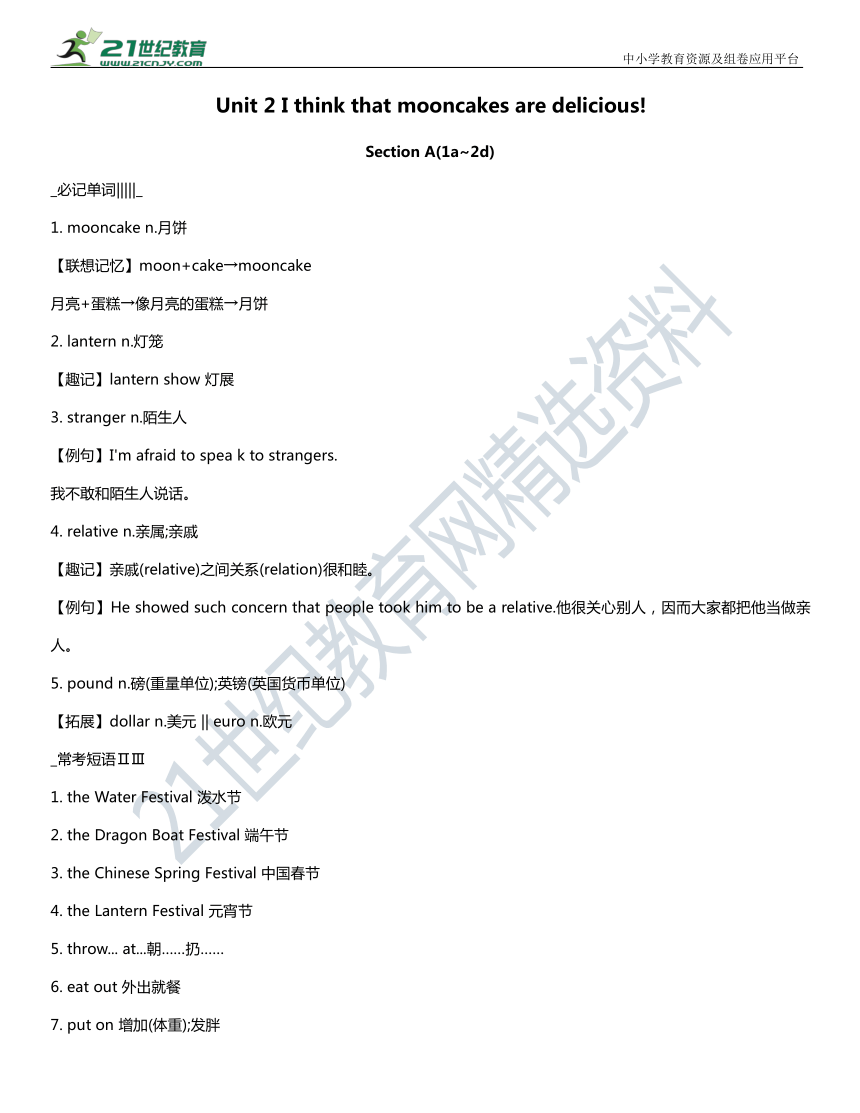 | |
| 格式 | docx | ||
| 文件大小 | 164.4KB | ||
| 资源类型 | 试卷 | ||
| 版本资源 | 人教新目标(Go for it)版 | ||
| 科目 | 英语 | ||
| 更新时间 | 2023-09-09 16:00:42 | ||
图片预览

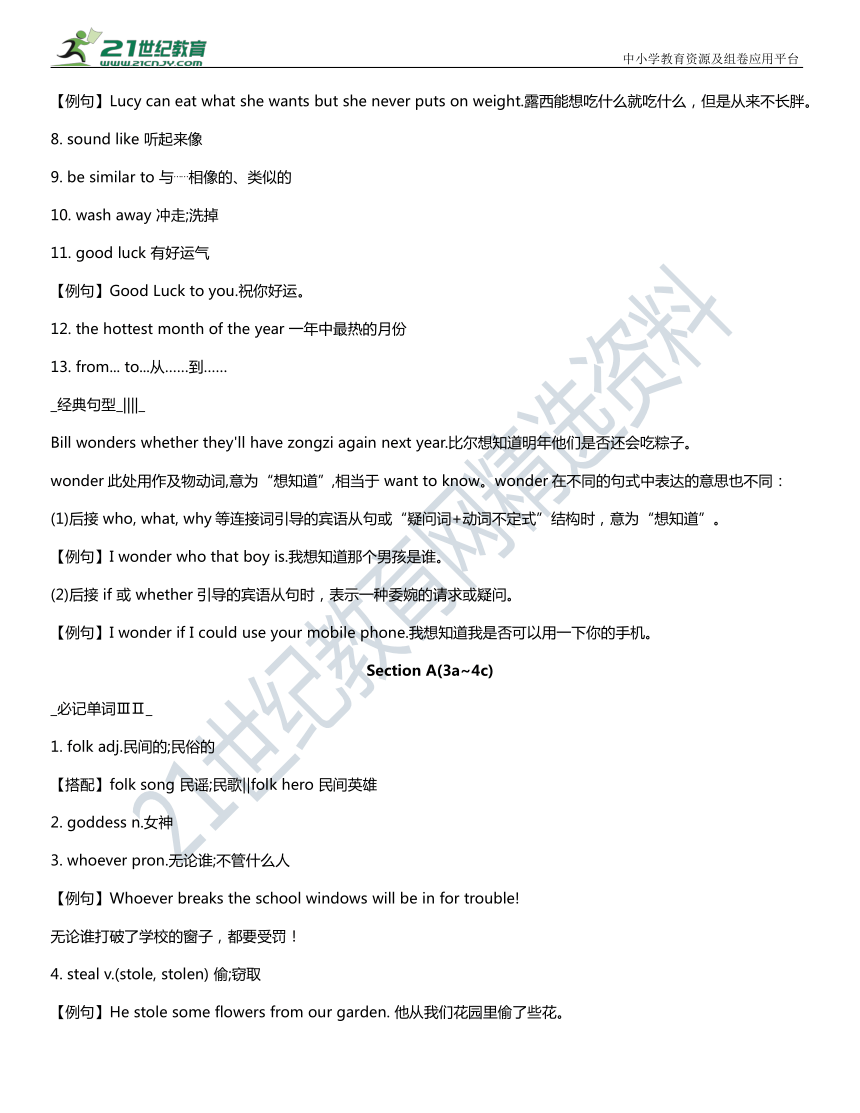
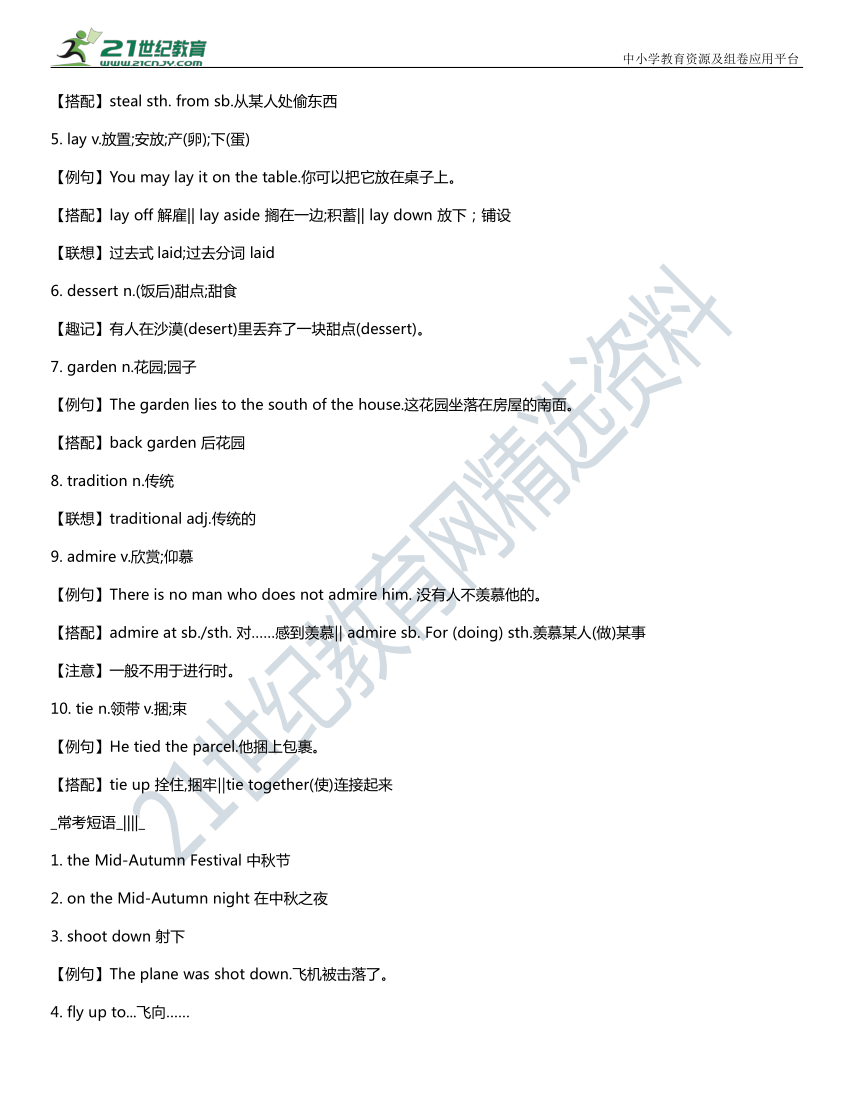
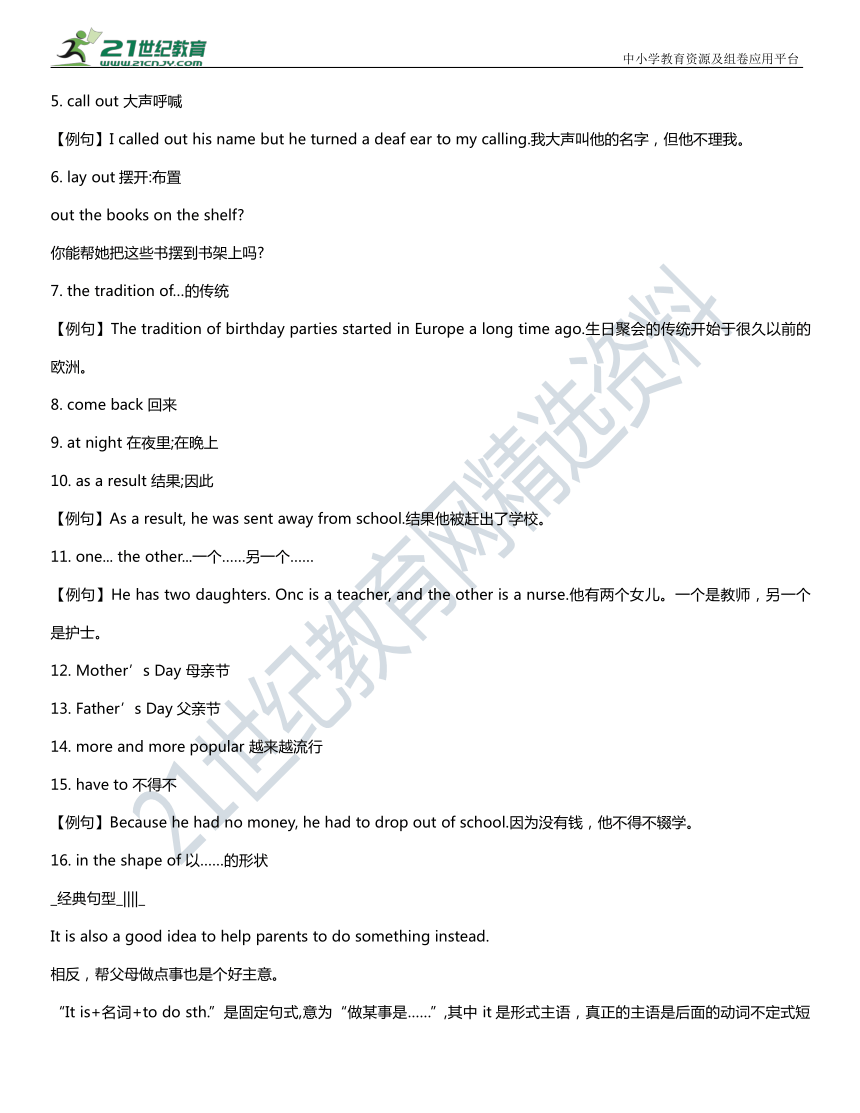
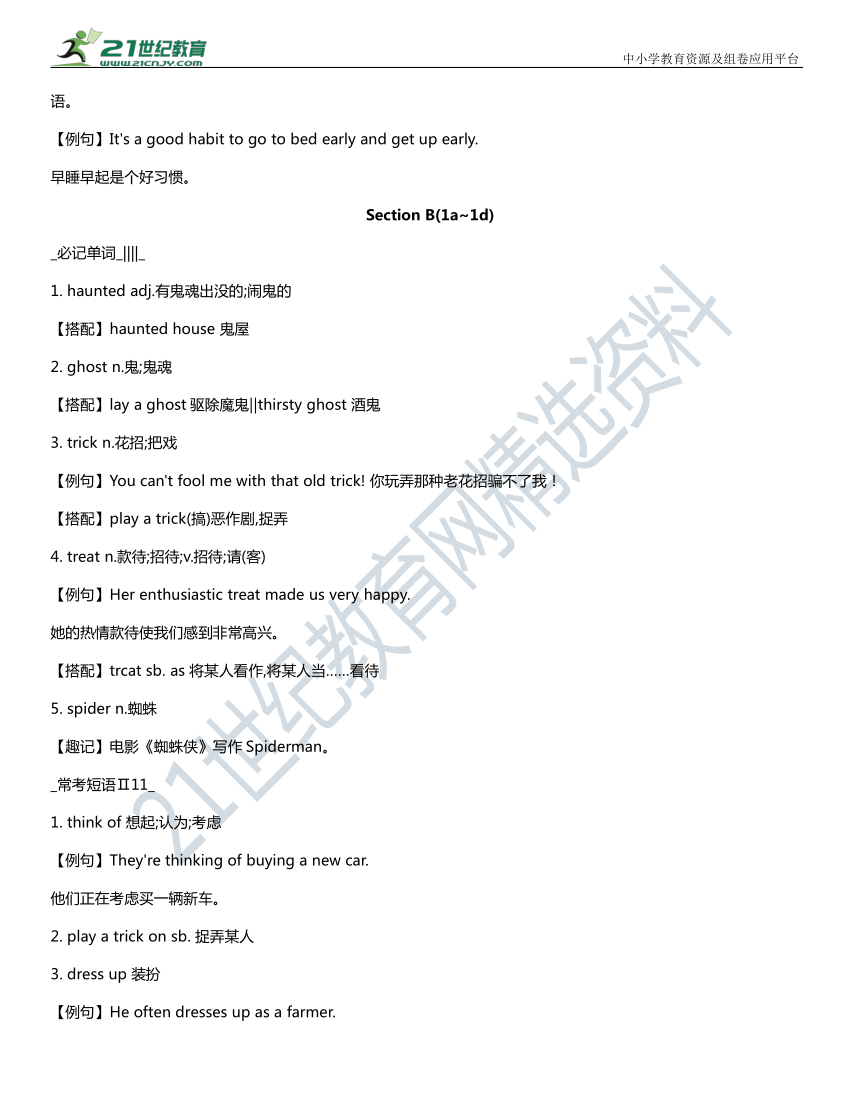
文档简介
中小学教育资源及组卷应用平台
Unit 2 I think that mooncakes are delicious!
Section A(1a~2d)
_必记单词|||||_
1. mooncake n.月饼
【联想记忆】moon+cake→mooncake
月亮+蛋糕→像月亮的蛋糕→月饼
2. lantern n.灯笼
【趣记】lantern show 灯展
3. stranger n.陌生人
【例句】I'm afraid to spea k to strangers.
我不敢和陌生人说话。
4. relative n.亲属;亲戚
【趣记】亲戚(relative)之间关系(relation)很和睦。
【例句】He showed such concern that people took him to be a relative.他很关心别人,因而大家都把他当做亲人。
5. pound n.磅(重量单位);英镑(英国货币单位)
【拓展】dollar n.美元 || euro n.欧元
_常考短语ⅡⅢ
1. the Water Festival 泼水节
2. the Dragon Boat Festival 端午节
3. the Chinese Spring Festival 中国春节
4. the Lantern Festival 元宵节
5. throw... at...朝……扔……
6. eat out 外出就餐
7. put on 增加(体重);发胖
【例句】Lucy can eat what she wants but she never puts on weight.露西能想吃什么就吃什么,但是从来不长胖。
8. sound like 听起来像
9. be similar to 与 相像的、类似的
10. wash away 冲走;洗掉
11. good luck 有好运气
【例句】Good Luck to you.祝你好运。
12. the hottest month of the year 一年中最热的月份
13. from... to...从……到……
_经典句型_||||_
Bill wonders whether they'll have zongzi again next year.比尔想知道明年他们是否还会吃粽子。
wonder此处用作及物动词,意为“想知道”,相当于 want to know。wonder在不同的句式中表达的意思也不同:
(1)后接 who, what, why等连接词引导的宾语从句或“疑问词+动词不定式”结构时,意为“想知道”。
【例句】I wonder who that boy is.我想知道那个男孩是谁。
(2)后接 if 或 whether引导的宾语从句时,表示一种委婉的请求或疑问。
【例句】I wonder if I could use your mobile phone.我想知道我是否可以用一下你的手机。
Section A(3a~4c)
_必记单词ⅢⅡ_
1. folk adj.民间的;民俗的
【搭配】folk song 民谣;民歌‖folk hero 民间英雄
2. goddess n.女神
3. whoever pron.无论谁;不管什么人
【例句】Whoever breaks the school windows will be in for trouble!
无论谁打破了学校的窗子,都要受罚!
4. steal v.(stole, stolen) 偷;窃取
【例句】He stole some flowers from our garden. 他从我们花园里偷了些花。
【搭配】steal sth. from sb.从某人处偷东西
5. lay v.放置;安放;产(卵);下(蛋)
【例句】You may lay it on the table.你可以把它放在桌子上。
【搭配】lay off 解雇|| lay aside 搁在一边;积蓄|| lay down 放下;铺设
【联想】过去式laid;过去分词 laid
6. dessert n.(饭后)甜点;甜食
【趣记】有人在沙漠(desert)里丢弃了一块甜点(dessert)。
7. garden n.花园;园子
【例句】The garden lies to the south of the house.这花园坐落在房屋的南面。
【搭配】back garden 后花园
8. tradition n.传统
【联想】traditional adj.传统的
9. admire v.欣赏;仰慕
【例句】There is no man who does not admire him. 没有人不羡慕他的。
【搭配】admire at sb./sth. 对……感到羡慕‖ admire sb. For (doing) sth.羡慕某人(做)某事
【注意】一般不用于进行时。
10. tie n.领带v.捆;束
【例句】He tied the parcel.他捆上包裹。
【搭配】tie up 拴住,捆牢‖tie together(使)连接起来
_常考短语_||||_
1. the Mid-Autumn Festival 中秋节
2. on the Mid-Autumn night 在中秋之夜
3. shoot down 射下
【例句】The plane was shot down.飞机被击落了。
4. fly up to...飞向……
5. call out 大声呼喊
【例句】I called out his name but he turned a deaf ear to my calling.我大声叫他的名字,但他不理我。
6. lay out摆开:布置
out the books on the shelf
你能帮她把这些书摆到书架上吗
7. the tradition of…的传统
【例句】The tradition of birthday parties started in Europe a long time ago.生日聚会的传统开始于很久以前的欧洲。
8. come back 回来
9. at night 在夜里;在晚上
10. as a result 结果;因此
【例句】As a result, he was sent away from school.结果他被赶出了学校。
11. one... the other...一个……另一个……
【例句】He has two daughters. Onc is a teacher, and the other is a nurse.他有两个女儿。一个是教师,另一个是护士。
12. Mother’s Day 母亲节
13. Father’s Day父亲节
14. more and more popular 越来越流行
15. have to 不得不
【例句】Because he had no money, he had to drop out of school.因为没有钱,他不得不辍学。
16. in the shape of 以……的形状
_经典句型_||||_
It is also a good idea to help parents to do something instead.
相反,帮父母做点事也是个好主意。
“It is+名词+to do sth.”是固定句式,意为“做某事是……”,其中 it是形式主语,真正的主语是后面的动词不定式短语。
【例句】It's a good habit to go to bed early and get up early.
早睡早起是个好习惯。
Section B(1a~1d)
_必记单词_||||_
1. haunted adj.有鬼魂出没的;闹鬼的
【搭配】haunted house 鬼屋
2. ghost n.鬼;鬼魂
【搭配】lay a ghost驱除魔鬼‖thirsty ghost 酒鬼
3. trick n.花招;把戏
【例句】You can't fool me with that old trick! 你玩弄那种老花招骗不了我!
【搭配】play a trick(搞)恶作剧,捉弄
4. treat n.款待;招待;v.招待;请(客)
【例句】Her enthusiastic treat made us very happy.
她的热情款待使我们感到非常高兴。
【搭配】trcat sb. as 将某人看作,将某人当……看待
5. spider n.蜘蛛
【趣记】电影《蜘蛛侠》写作Spiderman。
_常考短语Ⅱ11_
1. think of 想起;认为;考虑
【例句】They're thinking of buying a new car.
他们正在考虑买一辆新车。
2. play a trick on sb. 捉弄某人
3. dress up 装扮
【例句】He often dresses up as a farmer.
他常装扮成一个农民。
4. turn off关上
5. trick or treat 不招待就使坏(或“不给糖就捣蛋”)
6. learn about 了解
_经典句型ⅢⅡ
What does Wu Yu think of this festival 吴宇认为这个节日怎么样
What... think of... 意为“……认为……怎么样 ”相当于
“How... like... ”,这是用来询问某人对某事(物)或某人的看
法的常用句型。
【例句】What do you think of soap operas =How do you like soap operas 你认为肥皂剧怎么样
Section B(2a~3b)
_必记单词ⅢⅢ_
1. Christmas n.圣诞节
【例句】Merry Christmas! 圣诞快乐!
【注意】“在圣诞节”要说 at Christmas,不用 on,但可说 on
Christmas Day(Christmas day)。在 Christmas前不加定冠词the。
2. lie v.存在;平躺;处于
【例句】If you feel unwell, go and lie down. 如果你感到不舒服,就去躺下。
【搭配】lie down 躺下
【考点】现在分词lying;过去式 lay;过去分词 lain。
3. novel n.(长篇)小说
【联想】novelist n.小说家
4. eve n.前夕;前夜
【搭配】Christmas Eve 圣诞节前夜||New Year’s Eve除夕
5. dead adj.死的;失去生命的
【例句】He has been dead for two years.他去世两年了。
【考点】the dcad指“死者”,通
6. business n.生意;商业
【例句】He was inexperienced in business.他在商业方面缺乏经验。
【拓展】trade n.商业;交易
7. punish v.处罚;惩罚
【例句】Dangerous driving should be severely punished.
危险驾驶应受严惩。
【联想】punishment n.惩罚
【搭配】punish sb. for(doing) sth.因(做)某事惩罚某人
punish sb. by doing sth.通过做某事惩罚某人
8. warn v.警告;告诫
【搭配】warn sb. not to do sth.警告某人不要做某事‖warnsb. of sth.警告/预先通知某人某事‖warn sb. against doing
sth.警告/告诫某人不要做某事
9. present n.现在;礼物 adj.现在的
【例句】He bought me a valuable diamond ring as a birthday present.他给我买了一只贵重的钻戒作生口礼物。
【地质】(近)gu t n.个し物
10. warmth n.温暖;暖和
【例句】We felt the warmth of the sun.我们感受太阳的温暖。
11. spread v.传播;展开 n.蔓延;传播
【例句】The rumor was widely spread among the crowd.谣言在人群当中广泛地传播开来。
【搭配】spread out散开;分散 || spread over 传遍,延续;遍布于……
【拓展】过去式/过去分词是 spread。
_常考短语ⅢⅢ
1. the spirit of ……的精神
2. the importance of ……的重要性
3. care about 关心;在意
【例句】She cares about him and hates to see him hurt like this.
她关心他,不愿看到他受这样的伤。
4. take sb. back to...带某人回到……
5. end up 最终成为;最后处于
【例句】We didn't like it at first, but we ended up cheering.
一开始我们并不喜欢它,可最后我们欢呼起来。
6. remind sb. of 使某人想起
【例句】The pictures remind me of my school days.
这些照片使我想起了我的学生时代。
7. wake up 醒来
8. in need 需要帮助;处于困境中
【例句】A friend in need is a friend indeed. 患难之交才是真
朋友。
9. between…and…在……和……之间
10. treat sb. with...用……招待某人
11. the beginning of…的开始
【例句】That's the beginning of his new life.
那是他新生活的开始。
12. not only... but also...不但……而且……
【例句】Not only has he entered the college, but also he has
got an award.
他不仅上了那所大学,而且还获了奖。
13. give out分发;散发
【例句】Give the books out to the students. please.
请把这些书分给学生们吧。
单元语法
— that 和 if/whether引导的宾语从句
在复合句中,如果由一个句子充当宾语,这个句子叫做宾语
从句。引导宾语从句的常见关联词有 that, if/whether, what,
who, where, why 和how等,本单元主要学习 that 和if/whether
引导的宾语从句。
一、that 引导的宾语从句
1.关联词
当宾语从句是陈述句时,用 that 引导, that 在口语或非正
式文体中常省略。
I think(that) he'll return in an hour.
我想他将在一个小时以后回来。
【拓展】关联词 that 在下列情况下不可省略:
①当宾语从句的主语是 that时。
He says that that is a map of the city.
他说那是一幅城市地图。
②当宾语从句前有插入语时。
He says, in his letter, that he misses us very much.在他的信
中,他说他非常想念我们。
③当宾语从句是双宾语中的直接宾语时。
I can't tell him that his father died.
我不能告诉他他父亲去世了。
2.时态
(1)如果主句为一般现在时,从句可根据实际情况选择任意适
当的时态。
I'm sorry to hear that you were ill last week.听说你上周病了,
我很难过。
(2)如果主句是一般过去时,从句一般要用过去的某种时态。
She didn't know that Tom had left for Shanghai.她不知道汤姆
已经动身去了上海。
(3)当宾语从句是表达客观事实或自然规律的句子时,无论主
句是什么时态,宾语从句仍用一般现在时态。
The teacher told us that light travels faster than sound.老师告
诉我们光的传播速度比声音快。
3.语序
无论主句是陈述句还是疑问句,宾语从句都要用陈述语序,即
“连接词+主语+谓语+其他”。
I think you'll like the garden soon. 我觉得你很快就会喜欢这
座花园的。
Do you know that he will come back in two weeks 你知道他
会在两周后回来吗
二、if/whether 引导的宾语从句
当从句部分是一般疑问句或选择疑问句时,常用 if或
whether引导宾语从句, if/whether意为“是否”。
I wonder if/whether he is a driver.
我想知道他是不是个司机。
【拓展】一般情况下, if和 whether 可互换,在口语中多用if,而在
以下几种情况下,只能用 whether:
①当or not直接跟在关联词后时,只能用 whether。
I don't know whether or not they will come.
我不知道他们是否会来。
②在动词不定式之前只能用 whether。
He doesn't know whether to go or not.他不知道是否会去。
③在介词后通常用 whether。
It depends on whether I have enough time.那取决于我是否有足
够的时间。
助记:宾语从句的用法
宾语从句引导词,不同句子各相异。陈述句子用 that,一般疑问
“是否(if/whether)”替。
主句若为现在时,从句时态可随意。
主句若为过去时,从句时态多过去。
句子语序要记清,从句永保陈述序。
【例1】(南京)—I saw David in the teachers' office this morning.
Do you know _he was there
—He went there to hand in his homework.
A. howB. whetherC. whenD. why
【解析】我们可用“联系上下文法”解答此题。联系选项并分析句
子结构知空格所在句为含有宾语从句的主从复合句。由上句句
i的办公室里”可排除C项。再由
笑语句音“他土那儿交他的家庭作业了”可推知,此处询问他在办
公室的原因,故用 why引导宾语从句。故选D。
【答案】D
二 感叹句
一、定义:感叹句是表示赞美、惊叹、喜悦等感情的句子。
二、种类:感叹句通常由 what 或 how 引导,常用结构:
1. what 引导的感叹句:
(1) What+a/an+形容词+可数名词单数(+主语+谓语+其
他)!
What a beautiful birthday present(it is)!
多美的生日礼物呀!
(2) What+形容词+可数名词复数形式(+主语+谓语+其
他)!
What interesting stories (they are)!
(它们是)多么有趣的故事呀!
(3) What+形容词+不可数名词(+主语+谓语+其他)!
What fine weather(it is)! 多好的天气呀!
2. how 引导的感叹句:
(1) How+形容词/副词(+主语+谓语+其他)!
How tall the tree is! 多么高的树呀!
(2) How+形容词+a/an+可数名词单数(+主语+谓语)!
How beautiful a flower! 多美的一朵花呀!
【拓展】what 引导的感叹句通常可与 how 引导的感叹句进行
转换。
What a lovely girl she is! =How lovely a girl she is!
她是多么可爱的一个女孩啊!
助记:感叹句的用法
感叹句,表情感, what或 how 放句前。
名词短语跟 what. how 与形、副紧相连。
为了句子更简洁,主谓部分常不见。
【例2】(苏州) Guan Dong saved an old lady out of the Yangtze
River._great courage he showed!
A. What aB. WhatC. How aD. How
【解析】我们可用“固定句式法”解答此题。感叹句的构成有:①
How+形容词/副词(+主语+谓语+其它)! ②How+形容词
+a/an+可数名词单数(+主语+谓语)! ③What+a/an+形容
词+可数名词单数(+主语+谓语+其它)! ④What+形容词+
不可数名词/可数名词复数(+主语+谓语+其它)! 句中空格后
的名词 courage(勇气)为不可数名词,故前面不能加不定冠词a/
an,故选 B。
【答案】B
【例3】(南京)—_brave Zhang Hua is!
—Yes. He helped his neighbour. Mr Sun, out of the fire.
A. What aB. How
C. How aD. What
【解析】我们可用“固定句式法”解答此题。感叹部分 br ave 为形
容词,应用 how引导感叹句,其结构为:How+形容词(+主语+
谓语+其他)! 故选 B。
【答案】B
Unit 2 I think that mooncakes are delicious!
Section A(1a~2d)
_必记单词|||||_
1. mooncake n.月饼
【联想记忆】moon+cake→mooncake
月亮+蛋糕→像月亮的蛋糕→月饼
2. lantern n.灯笼
【趣记】lantern show 灯展
3. stranger n.陌生人
【例句】I'm afraid to spea k to strangers.
我不敢和陌生人说话。
4. relative n.亲属;亲戚
【趣记】亲戚(relative)之间关系(relation)很和睦。
【例句】He showed such concern that people took him to be a relative.他很关心别人,因而大家都把他当做亲人。
5. pound n.磅(重量单位);英镑(英国货币单位)
【拓展】dollar n.美元 || euro n.欧元
_常考短语ⅡⅢ
1. the Water Festival 泼水节
2. the Dragon Boat Festival 端午节
3. the Chinese Spring Festival 中国春节
4. the Lantern Festival 元宵节
5. throw... at...朝……扔……
6. eat out 外出就餐
7. put on 增加(体重);发胖
【例句】Lucy can eat what she wants but she never puts on weight.露西能想吃什么就吃什么,但是从来不长胖。
8. sound like 听起来像
9. be similar to 与 相像的、类似的
10. wash away 冲走;洗掉
11. good luck 有好运气
【例句】Good Luck to you.祝你好运。
12. the hottest month of the year 一年中最热的月份
13. from... to...从……到……
_经典句型_||||_
Bill wonders whether they'll have zongzi again next year.比尔想知道明年他们是否还会吃粽子。
wonder此处用作及物动词,意为“想知道”,相当于 want to know。wonder在不同的句式中表达的意思也不同:
(1)后接 who, what, why等连接词引导的宾语从句或“疑问词+动词不定式”结构时,意为“想知道”。
【例句】I wonder who that boy is.我想知道那个男孩是谁。
(2)后接 if 或 whether引导的宾语从句时,表示一种委婉的请求或疑问。
【例句】I wonder if I could use your mobile phone.我想知道我是否可以用一下你的手机。
Section A(3a~4c)
_必记单词ⅢⅡ_
1. folk adj.民间的;民俗的
【搭配】folk song 民谣;民歌‖folk hero 民间英雄
2. goddess n.女神
3. whoever pron.无论谁;不管什么人
【例句】Whoever breaks the school windows will be in for trouble!
无论谁打破了学校的窗子,都要受罚!
4. steal v.(stole, stolen) 偷;窃取
【例句】He stole some flowers from our garden. 他从我们花园里偷了些花。
【搭配】steal sth. from sb.从某人处偷东西
5. lay v.放置;安放;产(卵);下(蛋)
【例句】You may lay it on the table.你可以把它放在桌子上。
【搭配】lay off 解雇|| lay aside 搁在一边;积蓄|| lay down 放下;铺设
【联想】过去式laid;过去分词 laid
6. dessert n.(饭后)甜点;甜食
【趣记】有人在沙漠(desert)里丢弃了一块甜点(dessert)。
7. garden n.花园;园子
【例句】The garden lies to the south of the house.这花园坐落在房屋的南面。
【搭配】back garden 后花园
8. tradition n.传统
【联想】traditional adj.传统的
9. admire v.欣赏;仰慕
【例句】There is no man who does not admire him. 没有人不羡慕他的。
【搭配】admire at sb./sth. 对……感到羡慕‖ admire sb. For (doing) sth.羡慕某人(做)某事
【注意】一般不用于进行时。
10. tie n.领带v.捆;束
【例句】He tied the parcel.他捆上包裹。
【搭配】tie up 拴住,捆牢‖tie together(使)连接起来
_常考短语_||||_
1. the Mid-Autumn Festival 中秋节
2. on the Mid-Autumn night 在中秋之夜
3. shoot down 射下
【例句】The plane was shot down.飞机被击落了。
4. fly up to...飞向……
5. call out 大声呼喊
【例句】I called out his name but he turned a deaf ear to my calling.我大声叫他的名字,但他不理我。
6. lay out摆开:布置
out the books on the shelf
你能帮她把这些书摆到书架上吗
7. the tradition of…的传统
【例句】The tradition of birthday parties started in Europe a long time ago.生日聚会的传统开始于很久以前的欧洲。
8. come back 回来
9. at night 在夜里;在晚上
10. as a result 结果;因此
【例句】As a result, he was sent away from school.结果他被赶出了学校。
11. one... the other...一个……另一个……
【例句】He has two daughters. Onc is a teacher, and the other is a nurse.他有两个女儿。一个是教师,另一个是护士。
12. Mother’s Day 母亲节
13. Father’s Day父亲节
14. more and more popular 越来越流行
15. have to 不得不
【例句】Because he had no money, he had to drop out of school.因为没有钱,他不得不辍学。
16. in the shape of 以……的形状
_经典句型_||||_
It is also a good idea to help parents to do something instead.
相反,帮父母做点事也是个好主意。
“It is+名词+to do sth.”是固定句式,意为“做某事是……”,其中 it是形式主语,真正的主语是后面的动词不定式短语。
【例句】It's a good habit to go to bed early and get up early.
早睡早起是个好习惯。
Section B(1a~1d)
_必记单词_||||_
1. haunted adj.有鬼魂出没的;闹鬼的
【搭配】haunted house 鬼屋
2. ghost n.鬼;鬼魂
【搭配】lay a ghost驱除魔鬼‖thirsty ghost 酒鬼
3. trick n.花招;把戏
【例句】You can't fool me with that old trick! 你玩弄那种老花招骗不了我!
【搭配】play a trick(搞)恶作剧,捉弄
4. treat n.款待;招待;v.招待;请(客)
【例句】Her enthusiastic treat made us very happy.
她的热情款待使我们感到非常高兴。
【搭配】trcat sb. as 将某人看作,将某人当……看待
5. spider n.蜘蛛
【趣记】电影《蜘蛛侠》写作Spiderman。
_常考短语Ⅱ11_
1. think of 想起;认为;考虑
【例句】They're thinking of buying a new car.
他们正在考虑买一辆新车。
2. play a trick on sb. 捉弄某人
3. dress up 装扮
【例句】He often dresses up as a farmer.
他常装扮成一个农民。
4. turn off关上
5. trick or treat 不招待就使坏(或“不给糖就捣蛋”)
6. learn about 了解
_经典句型ⅢⅡ
What does Wu Yu think of this festival 吴宇认为这个节日怎么样
What... think of... 意为“……认为……怎么样 ”相当于
“How... like... ”,这是用来询问某人对某事(物)或某人的看
法的常用句型。
【例句】What do you think of soap operas =How do you like soap operas 你认为肥皂剧怎么样
Section B(2a~3b)
_必记单词ⅢⅢ_
1. Christmas n.圣诞节
【例句】Merry Christmas! 圣诞快乐!
【注意】“在圣诞节”要说 at Christmas,不用 on,但可说 on
Christmas Day(Christmas day)。在 Christmas前不加定冠词the。
2. lie v.存在;平躺;处于
【例句】If you feel unwell, go and lie down. 如果你感到不舒服,就去躺下。
【搭配】lie down 躺下
【考点】现在分词lying;过去式 lay;过去分词 lain。
3. novel n.(长篇)小说
【联想】novelist n.小说家
4. eve n.前夕;前夜
【搭配】Christmas Eve 圣诞节前夜||New Year’s Eve除夕
5. dead adj.死的;失去生命的
【例句】He has been dead for two years.他去世两年了。
【考点】the dcad指“死者”,通
6. business n.生意;商业
【例句】He was inexperienced in business.他在商业方面缺乏经验。
【拓展】trade n.商业;交易
7. punish v.处罚;惩罚
【例句】Dangerous driving should be severely punished.
危险驾驶应受严惩。
【联想】punishment n.惩罚
【搭配】punish sb. for(doing) sth.因(做)某事惩罚某人
punish sb. by doing sth.通过做某事惩罚某人
8. warn v.警告;告诫
【搭配】warn sb. not to do sth.警告某人不要做某事‖warnsb. of sth.警告/预先通知某人某事‖warn sb. against doing
sth.警告/告诫某人不要做某事
9. present n.现在;礼物 adj.现在的
【例句】He bought me a valuable diamond ring as a birthday present.他给我买了一只贵重的钻戒作生口礼物。
【地质】(近)gu t n.个し物
10. warmth n.温暖;暖和
【例句】We felt the warmth of the sun.我们感受太阳的温暖。
11. spread v.传播;展开 n.蔓延;传播
【例句】The rumor was widely spread among the crowd.谣言在人群当中广泛地传播开来。
【搭配】spread out散开;分散 || spread over 传遍,延续;遍布于……
【拓展】过去式/过去分词是 spread。
_常考短语ⅢⅢ
1. the spirit of ……的精神
2. the importance of ……的重要性
3. care about 关心;在意
【例句】She cares about him and hates to see him hurt like this.
她关心他,不愿看到他受这样的伤。
4. take sb. back to...带某人回到……
5. end up 最终成为;最后处于
【例句】We didn't like it at first, but we ended up cheering.
一开始我们并不喜欢它,可最后我们欢呼起来。
6. remind sb. of 使某人想起
【例句】The pictures remind me of my school days.
这些照片使我想起了我的学生时代。
7. wake up 醒来
8. in need 需要帮助;处于困境中
【例句】A friend in need is a friend indeed. 患难之交才是真
朋友。
9. between…and…在……和……之间
10. treat sb. with...用……招待某人
11. the beginning of…的开始
【例句】That's the beginning of his new life.
那是他新生活的开始。
12. not only... but also...不但……而且……
【例句】Not only has he entered the college, but also he has
got an award.
他不仅上了那所大学,而且还获了奖。
13. give out分发;散发
【例句】Give the books out to the students. please.
请把这些书分给学生们吧。
单元语法
— that 和 if/whether引导的宾语从句
在复合句中,如果由一个句子充当宾语,这个句子叫做宾语
从句。引导宾语从句的常见关联词有 that, if/whether, what,
who, where, why 和how等,本单元主要学习 that 和if/whether
引导的宾语从句。
一、that 引导的宾语从句
1.关联词
当宾语从句是陈述句时,用 that 引导, that 在口语或非正
式文体中常省略。
I think(that) he'll return in an hour.
我想他将在一个小时以后回来。
【拓展】关联词 that 在下列情况下不可省略:
①当宾语从句的主语是 that时。
He says that that is a map of the city.
他说那是一幅城市地图。
②当宾语从句前有插入语时。
He says, in his letter, that he misses us very much.在他的信
中,他说他非常想念我们。
③当宾语从句是双宾语中的直接宾语时。
I can't tell him that his father died.
我不能告诉他他父亲去世了。
2.时态
(1)如果主句为一般现在时,从句可根据实际情况选择任意适
当的时态。
I'm sorry to hear that you were ill last week.听说你上周病了,
我很难过。
(2)如果主句是一般过去时,从句一般要用过去的某种时态。
She didn't know that Tom had left for Shanghai.她不知道汤姆
已经动身去了上海。
(3)当宾语从句是表达客观事实或自然规律的句子时,无论主
句是什么时态,宾语从句仍用一般现在时态。
The teacher told us that light travels faster than sound.老师告
诉我们光的传播速度比声音快。
3.语序
无论主句是陈述句还是疑问句,宾语从句都要用陈述语序,即
“连接词+主语+谓语+其他”。
I think you'll like the garden soon. 我觉得你很快就会喜欢这
座花园的。
Do you know that he will come back in two weeks 你知道他
会在两周后回来吗
二、if/whether 引导的宾语从句
当从句部分是一般疑问句或选择疑问句时,常用 if或
whether引导宾语从句, if/whether意为“是否”。
I wonder if/whether he is a driver.
我想知道他是不是个司机。
【拓展】一般情况下, if和 whether 可互换,在口语中多用if,而在
以下几种情况下,只能用 whether:
①当or not直接跟在关联词后时,只能用 whether。
I don't know whether or not they will come.
我不知道他们是否会来。
②在动词不定式之前只能用 whether。
He doesn't know whether to go or not.他不知道是否会去。
③在介词后通常用 whether。
It depends on whether I have enough time.那取决于我是否有足
够的时间。
助记:宾语从句的用法
宾语从句引导词,不同句子各相异。陈述句子用 that,一般疑问
“是否(if/whether)”替。
主句若为现在时,从句时态可随意。
主句若为过去时,从句时态多过去。
句子语序要记清,从句永保陈述序。
【例1】(南京)—I saw David in the teachers' office this morning.
Do you know _he was there
—He went there to hand in his homework.
A. howB. whetherC. whenD. why
【解析】我们可用“联系上下文法”解答此题。联系选项并分析句
子结构知空格所在句为含有宾语从句的主从复合句。由上句句
i的办公室里”可排除C项。再由
笑语句音“他土那儿交他的家庭作业了”可推知,此处询问他在办
公室的原因,故用 why引导宾语从句。故选D。
【答案】D
二 感叹句
一、定义:感叹句是表示赞美、惊叹、喜悦等感情的句子。
二、种类:感叹句通常由 what 或 how 引导,常用结构:
1. what 引导的感叹句:
(1) What+a/an+形容词+可数名词单数(+主语+谓语+其
他)!
What a beautiful birthday present(it is)!
多美的生日礼物呀!
(2) What+形容词+可数名词复数形式(+主语+谓语+其
他)!
What interesting stories (they are)!
(它们是)多么有趣的故事呀!
(3) What+形容词+不可数名词(+主语+谓语+其他)!
What fine weather(it is)! 多好的天气呀!
2. how 引导的感叹句:
(1) How+形容词/副词(+主语+谓语+其他)!
How tall the tree is! 多么高的树呀!
(2) How+形容词+a/an+可数名词单数(+主语+谓语)!
How beautiful a flower! 多美的一朵花呀!
【拓展】what 引导的感叹句通常可与 how 引导的感叹句进行
转换。
What a lovely girl she is! =How lovely a girl she is!
她是多么可爱的一个女孩啊!
助记:感叹句的用法
感叹句,表情感, what或 how 放句前。
名词短语跟 what. how 与形、副紧相连。
为了句子更简洁,主谓部分常不见。
【例2】(苏州) Guan Dong saved an old lady out of the Yangtze
River._great courage he showed!
A. What aB. WhatC. How aD. How
【解析】我们可用“固定句式法”解答此题。感叹句的构成有:①
How+形容词/副词(+主语+谓语+其它)! ②How+形容词
+a/an+可数名词单数(+主语+谓语)! ③What+a/an+形容
词+可数名词单数(+主语+谓语+其它)! ④What+形容词+
不可数名词/可数名词复数(+主语+谓语+其它)! 句中空格后
的名词 courage(勇气)为不可数名词,故前面不能加不定冠词a/
an,故选 B。
【答案】B
【例3】(南京)—_brave Zhang Hua is!
—Yes. He helped his neighbour. Mr Sun, out of the fire.
A. What aB. How
C. How aD. What
【解析】我们可用“固定句式法”解答此题。感叹部分 br ave 为形
容词,应用 how引导感叹句,其结构为:How+形容词(+主语+
谓语+其他)! 故选 B。
【答案】B
同课章节目录
- Unit 1 How can we become good learners.
- Section A
- Section B
- Unit 2 I think that mooncakes are delicious!
- Section A
- Section B
- Unit 3 Could you please tell me where the restroom
- Section A
- Section B
- Unit 4 I used to be afraid of the dark.
- Section A
- Section B
- Unit 5 What are the shirts made of?
- Section A
- Section B
- Review of Units 1-5
- Unit 6 When was it invented?
- Section A
- Section B
- Unit 7 Teenagers should be allowed to choose their
- Section A
- Section B
- Unit 8 It must belong to Carla.
- Section A
- Section B
- Unit 9 I like music that I can dance to.
- Section A
- Section B
- Unit 10 You're supposed to shake hands.
- Section A
- Section B
- Review of Units 6-10
- Unit 11 Sad movies make me cry.
- Section A
- Section B
- Unit 12 Life is full of the unexpected
- Section A
- Section B
- Unit 13 We're trying to save the earth!
- Section A
- Section B
- Unit 14 I remember meeting all of you in Grade 7.
- Section A
- Section B
- Review of Units 11-14
